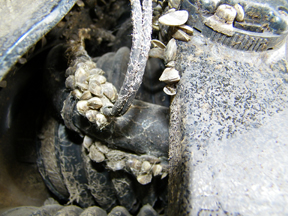 The Colorado Division of Wildlife is concerned by the serious threat posed to our aquatic habitats by two non-native/invasive aquatic mussels —the Zebra mussel (Dreissena polymorpha) and the Quagga mussel (Dreissena bugensis).
The Colorado Division of Wildlife is concerned by the serious threat posed to our aquatic habitats by two non-native/invasive aquatic mussels —the Zebra mussel (Dreissena polymorpha) and the Quagga mussel (Dreissena bugensis).
Zebra mussels are native to the Black Sea and Caspian Sea, though have been moved to numerous locations in Europe and North America.
How to Identify the Zebra Mussel
A medium sized bivalve (two shells) which is nearly triangular in shape. Shell color alternates between a yellowish and darker brown often forming stripes.
Colorado waterways and reservoirs are at serious threat by Quagga mussels, which are more cold tolerant than the well-known Zebra mussel and have been found in California, Nevada and Arizona, including Lake Mead.
This species is native to Eastern Europe but has been transported to North America.
How to Identify the Quagga Mussel
 A medium-sized bivalve (two shells) which has a more rounded triangular shape than the similar Zebra mussel. The two valves are asymmetrical thus creating a keeled edge. Shell color alternates between a yellowish and darker brown often forming stripes.
A medium-sized bivalve (two shells) which has a more rounded triangular shape than the similar Zebra mussel. The two valves are asymmetrical thus creating a keeled edge. Shell color alternates between a yellowish and darker brown often forming stripes.
Overland transport on boats, motors, trailers and other watercraft poses the greatest risk for spreading zebra and quagga mussels. Adult mussels can attach or “hitchhike” to any surface and can live several days out of water (depending on the time of year) in moist, shaded areas. The microscopic mussel larvae (knows as veligers) can be transferred in water contained in live wells, bilge, ballast tanks or “minnow” buckets.
For further information about zebra and quagga mussels and how to help prevent their spread, please visit: 100th Meridian Initiative and Protect Your Waters.
Help Stop Mussels 
See the Mandatory Boat Inspections page to view the 2010 boating regulations, the list of watercraft inspection and decontamination sites, "clean, drain and dry" information, as well as how-to videos, news releases on where they've been found and more.
Report Sightings!
Timely and accurate identification is very important in dealing with invasive species. To help the Colorado Division of Wildlife quickly identify new populations of this unwanted species please report any sightings to Elizabeth Brown, Invasive Species Coordinator, 303-291-7362.